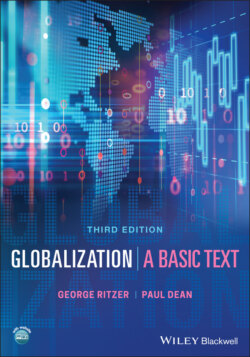Читать книгу Globalization - George Ritzer - Страница 49
WHAT DRIVES GLOBALIZATION?
ОглавлениеThis is another highly complex question with no easy answers. For example, if we accept the fact that there are multiple globalizations, then it is clear that it would be illusory to think that we could find a single driver, or even a small number of drivers. Yet, to seek out the drivers of each and every form of globalization would be a long and tedious process. At this point, at least, we need to restrict ourselves to a search for the drivers of globalization at the most general level. While we will focus on globalization in general, many of these same factors apply to at least some of the more specific globalizations.
One way to approach this is through one of the classic divisions in the social sciences – the distinction between material and ideational explanations. A material, or materialist, explanation would tend to focus on objective factors and forces. While there can be other material forces (e.g. the nation-state in the political realm), this generally comes down, as it did for Karl Marx (who was a materialist), to a focus on economic factors such as “forces” and “relations” of production, technology, and so on. It is this kind of thinking that leads many to the view that it is capitalism in general, or the contemporary MNC, that is the most important driving force in contemporary globalization.
The polar view, as it was for Marx, is that it is not material factors, but rather ideational (or “ideal”) factors, that are the main drivers of globalization. The emphasis on ideational factors was characteristic of the philosopher G. W. F. Hegel and his followers, the “young Hegelians.” Marx came of age in this intellectual context, but famously planted Hegel on his feet by focusing on material rather than ideational factors. However, Marx retained a secondary interest in such idea systems as ideology (for more on ideology, at least as it relates to the neoliberal view of globalization, see Chapter 4). Today, the idealist position on globalization is that the main drivers of the process are changes in thinking and ideas, as well as in information and knowledge. We have come increasingly to think in global, rather than in local, or even in national, terms. And, our knowledge base has followed suit so that it, too, is increasingly global in scope. A good example of the latter involves the issue of global climate change. In some ways (because, for example, of movies and books like Al Gore’s [2006] An Inconvenient Truth) we have come to know a great deal about global climate and climate change, perhaps a lot more than we know about our local climate (Brulle et al. 2012). And this greater knowledge about global climate change is leading at long last to more serious global efforts to deal with its causes and consequences. Thus, in this view, globalization is driven not by material changes, but by changes in ideas and knowledge.
Of course, there is a middle ground on this which sees both material and ideational factors as being of great importance. In terms of the history of social theory, Max Weber was the most famous social theorist to adopt such a view. While he set out, in contrast to Marx and the Marxists, to show the importance of ideational factors (e.g. the role of the ethos of Protestantism in the rise of capitalism in the West [Weber 1904–1905/1958]), this was in the context of a larger view that recognized the importance of both ideational and material factors (Weber 1927/1981). Actually, in the end, Weber saw material factors as the main drivers, but what is of greatest importance from our point of view is that he accorded importance to both. Thus, from this perspective, we can see globalization as being driven by a range of both material and ideational drivers. This is clear today in the global green movement which is driven by both ideas (e.g. those of Al Gore) and material realities (high gasoline prices or the drive for greater profit).
